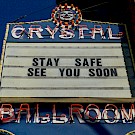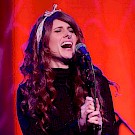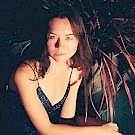 Emily King has always been an independent soul, but innate talent is a family affair: Her parents are world-class jazz duo Marion Cowings and Kim Kalesti. A New York-based singer-songwriter, King traveled regularly with her parents, leaving high school at the age of 16 and earning her GED to actively pursue her music career.
Emily King has always been an independent soul, but innate talent is a family affair: Her parents are world-class jazz duo Marion Cowings and Kim Kalesti. A New York-based singer-songwriter, King traveled regularly with her parents, leaving high school at the age of 16 and earning her GED to actively pursue her music career.
Her debut album, East Side Story (2007), was a nod to her Lower East Side Manhattan upbringing and was nominated for a Grammy for Best Contemporary R&B Album. King recorded her critically acclaimed follow-up EP, Seven (2011), at home. King has toured with John Legend and opened for artists including Nas, Alicia Keys, Chaka Khan, Erykah Badu, Emeli Sande and—most recently, in 2014—for Sara Bareilles.
On this tour, King headlines in support of her second full-length album, The Switch, released on the independent label she started, Making Music Records, and she'll stop in Portland at the Doug Fir on Tuesday, February 2 with local soul songstress Moorea Masa. Vortex spoke with her briefly by phone.
 Is this a first tour stop for you in Portland? Have you been here before?
Is this a first tour stop for you in Portland? Have you been here before?
I’ve been to Portland a handful of times. Last time I was there was two summers ago. I was on tour with Sara Bareilles and we stopped in Portland. We didn’t play, but we stopped there. And I just went thrift-shopping crazy! It was a heavenly experience—one of those good shopping days where you find all kinds of stuff, some clothes, some rings, and some good food—food truck food. So, combined with that, I have very fond memories.
What does this first tour on your own mean to you?
It means a lot. It felt like a long road to get here and I’m thankful for the experience. I’m also thankful to be able to go out, headline, have a long show, and be face to face with these people who have been supporting me. I’ve been a supporting act, I’ve opened for a lot of different artists for 10 years now, so it’s a big deal for me.
That’s not unlike Moorea Masa, who is opening for you. She is a solid, soulful artist who has been a supporting act and vocalist. In fact, I first learned of your music through her cover of your song “Distance.”
That’s amazing! What’s been a real eye-opener for me is just how much artists support each other and that can really go a long way to just help each other make progress and expose each other to new people. I’m definitely looking forward to the show!
Similarly, you’ve been performing since you were about 16. In all that time, who blew you away or blew your mind to perform with or before their act?
Ooh, well, let’s see how good my memory is. The juggler, the clown act—they were all great [laughs]. So many random shows, but I’m going to go with the most recent which was on tour with Sara Bareilles. She is such a strong singer, every night she blew me away singing those big hooks and making it seem so easy. How genuine she is on stage was a real eye-opener for me. So often in this business you come across people who are playing a role, a character that they saw on TV and they think that’s how they’re supposed to act, but Sara is so natural with the audience. I learned a lot.
I wanted to ask you about some of the tracks on The Switch. As I was listening to songs like “The Animals” (watch the video below) or “Believer” I thought, "This could almost be a Prince song," especially with those climbing harmonies in the chorus and rhythmic breakdowns. And “Distance” has this Smokey Robinson meets '60s waltz and symphonic pop. It definitely goes through some movements, as do most of the tracks. I even hear some distinct Motown, jazz and some surprising rock elements throughout. And then you layer a breathy soul over the top of the mix. Did I miss anything?
Well, you certainly covered a lot of the bases there [laughs]. All of that stuff I love, and I reference, and I’ve been influenced by all of those records. I grew up listening to R&B and jazz and still listen to a lot of classic rock music. That was a big part of this album. My producer and partner, Jeremy Most, pays very close attention to details, and when you’re trying to build a style, you have to do that. A lot of it is bringing your influences to today’s world and trying to make something different out of them instead of just replaying the same old stuff.
We kind of tried to mix in what we love and put our own twist on it. I think using more modern instruments, synths, drum machines—things like that, not that this is a new thing, but there’s the moment where you take your influences and you regurgitate with your own DNA. You have a Motown bassline, you might put more of a rock flavor on top of it, but then, maybe the drums are going to be more techno. You want to surprise yourself and one of the ways to do that is just throw a bunch of things together that aren’t supposed to be there and make it work.
 On “Out of the Clouds” (listen below), I thought, "Holy Burt Bacharach, where is she going with this one?!"
On “Out of the Clouds” (listen below), I thought, "Holy Burt Bacharach, where is she going with this one?!"
[Laughs] Nice! Love Burt Bacharach! That’s it right there! I’m trying to break down any rules in my head of what is supposed to be cool and what isn’t. Just go with what I like. If I hear a melody and I like it, maybe it sounds like Broadway, but I’m just gonna do it.
Your mother and father are the famous jazz duo Marion Cowings and Kim Kalesti. Being their child, tell me one valuable thing you learned from each of your parents, either about music or anything else that’s become a big part of you.
Wow. Just one thing? [laughs]. One of the things I’ll always remember that my parents taught me about being a performer is to tell the story of the song. When I was a kid, the songs that they sang were from the Great American Songbook. All of the gorgeous lyrics were really romantic, poetic things. You hear a lot of singers sing these songs and they don’t even pay attention to the meaning of the song; they’re focused on their performances. It happens all the time, and it’s like, "Is anybody home?" And my folks were always very adamant about telling stories no matter what.
I think that I’m drawn to artists who do the same. They don’t necessarily have the best voice, or they could be a great singer but they just tell the story and every word counts and it’ll make you feel something. That’s important to me. But if I find myself practicing and I start thinking about the bills I have to pay or having to say the right thing to this person and all this while I’m singing the song, it’s like: "Why are you singing the song then?" That’s the most challenging thing, is to be focused as a performer. To always be present in that song and in every single note, to be present instead of drifting away. It’s just like when you meditate, you’re supposed to drift away but refocus your attention. But once you get there, that’s when you hit the mark.






